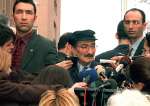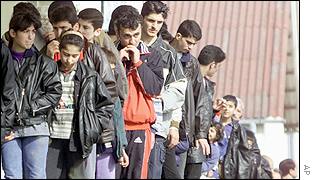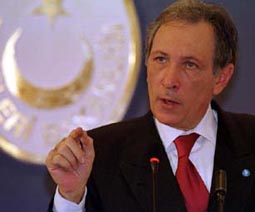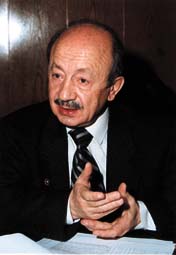5
October 2001
![]()
2. "US welcomes Turkey's constitutional reforms as 'major milestone'", the United States on Thursday hailed this week's passage by Turkey's parliament of wide-ranging constitutional reforms aimed at boosting Ankara's bid to join the European Union.
3. "Mixed reactions to Turkey's reforms", the Turkish parliament has voted overwhelmingly to overhaul the restrictive 1982 constitution, in a move intended to improve the country's chances of joining the European Union.
4. "'Moving from bridge to frontline state', Many strategists now argue that the world will be different from the world we knew before the unprecedented terrorist attack staged against the United States on Sept. 11.
5. "We are waiting for the decision of EHRC", Justice Minister Turk said that they would wait for the decision of EHRC on the capital punishment given to PKK President Abdullah Ocalan, adding that the Parliament "will decide according to the interests of the country"
6. "Party leaders on trial", HADEP former leader Demir, SIP leader Guler, TSIP leader Kocak on trial for speeches made at HADEP congress.
1. - AFP - "Turkey's death penalty conflicts with EU standards: Council of Europe":
STRASBOURG
The Council of Europe on Thursday commended Turkey on its adoption
of wide-ranging constitutional reforms, but said the country's refusal
to abolish the death penalty remained a roadblock in its bid to join
the European Union.
"The constitutional reform approved by the Turkish parliament yesterday is an imporant step forward in meeting the Counci of Europe's standards of democracy and human rights," Lord Russell-Johnston, president of the human rights and pro-democracy body's parliamentary assembly, said in a statement. Turkey's parliament adopted a package of 34 constitutional amendments Wednesday, including ones that give more rights to its Kurdish minority, expand freedom of expression, and reform the justice system.
One of the amendments abolished the death penalty, except in times of war, imminent threat of war and for terrorist crimes. Russell-Johnston said in his statement, "I welcome the decision to limit the death penalty, but wish to reiterate that the Council of Europe's opposition to capital punishment is unconditional."
"Therefore, only a complete abolition, including for terrorist offences, will be able to fully meet the Council of Europe's, and consequently, the European Union's standards in this regard," he said.
The European Commission -- the EU's executive arm -- is
to wrap up its annual report in November on Turkey's progress towards
EU membership since it was granted candidate's status in 1999. ![]()
2. - AFP - "US welcomes Turkey's constitutional reforms as 'major milestone'":
WASHINGTON
The United States on Thursday hailed this week's passage by Turkey's
parliament of wide-ranging constitutional reforms aimed at boosting
Ankara's bid to join the European Union.
"These are very important and we believe significant reform efforts and we applaud the passage of this package of reforms by Turkey's parliament," State Department spokesman Richard Boucher said. "Passage of this package represents a major milestone in Turkey's reform efforts," he told reporters, adding that the parliament now had to pass further laws to implement the changes.
Boucher said the reforms reflected the ideal of a US-led anti-terrorism coalition formed since the September 11 attacks in New York and Washington. "This package of constitutional changes embodies the values that the international coalition is defending," he said, noting that Turkey had pledged its full backing to the anti-terrorism campaign. The 34 changes expand freedom of expression and association, ensure gender equality in the family, guarantee privacy rights, limit the use of the death penalty and increase civilian membership on the national security council.
The reforms, endorsed Wednesday at the end of a two-week
extraordinary session, are the largest ever overhaul of Turkey's constitution.
However, analysts said that while encouraging, the measures still leave
Turkey lagging behind European norms. ![]()
3. - BBC - "Mixed reactions to Turkey's reforms":
ISTANBUL / by Nick Thorpe 
The Turkish parliament has voted overwhelmingly to overhaul the
restrictive 1982 constitution, in a move intended to improve the country's
chances of joining the European Union.
Thirty-four amendments were passed - many of them after almost 20 years of protests by human rights groups and foreign observers.
The package has been hailed as a success by many, especially considering the unfavourable climate for human rights issues, in the aftermath of the 11 September attacks in the United States.
But critics say that three other amendments, which failed to win the necessary three-fifths majority, as well as remaining problems with the constitution, will still cripple Turkey's bid to join the EU.
Copenhagen criteria 
Turkey was recognised as a candidate for membership at the Helsinki
summit in 1999, but will only be allowed to begin substantive talks
once political and economic conditions - known as the Copenhagen criteria
- are met.
"A great step has been taken in order to improve our democracy," Prime Minister Bulent Ecevit told parliament after the vote. Among the most significant changes is the abolition of the death penalty, except for terrorist offences, or in times of war.
No executions have taken place in Turkey since 1984, but the amendment was carefully drafted to leave open the possibility that the Kurdish guerrilla leader, Abdullah Ocalan, can still be executed. He was sentenced to death in December 1999 for organising a 15-year uprising of Kurds in Turkey.
Kurdish issue 
The rights of the estimated 12 million Kurds in Turkey remain extremely
restricted, even after the current amendments. They are still not recognised
as a minority, and have no right to education in their own language.
They will, however, now be allowed, in principle, to broadcast in Kurdish.
Broadcasts can still be banned if they are judged to threaten "national
security" and "public safety".
The right to free expression has also been increased. Under the 1982 constitution, anti-state 'comments' were judged to be a crime - this has led to the trial and imprisonment of dozens of intellectuals and public figures. Now, only anti-state 'activities' are a criminal offence.
More civilian powers
Other key amendments to the constitution will make it harder to ban political parties, and will increase the number of civilians on the all-powerful national security council, which has until now been dominated by the military.
Some police powers will also be reduced. The period allowed to the police to detain suspects without charge is reduced from 15 to four days. The holding of public rallies will also become somewhat easier.
Domestic and international reaction to the changes has been mixed. Western diplomats have cautiously welcomed them, as a milestone on Turkey's path to the EU. International human rights groups have expressed disappointment.
"The Turkish parliament turned what could have been
a defining moment of change into just another lost opportunity,"
said Elizabeth Andersen, of Human Rights Watch in Washington.
Three amendments failed
Three important amendments failed to win the necessary three-fifths majority. One will make it harder for two popular Islamists, Necmettin Erbakan and Recep Tayyip Erdogan, currently banned, to return to politics. Mr Erbakan was briefly prime minister in 1997, before his Welfare Party was banned. He is now the driving force behind the Felicity Party (SP).
His rival, Mr Erdogan, rose to prominence as mayor of Istanbul, and now heads the White Party (AK). The party defines itself as "modern, European, and conservative" and was only founded in July. It now leads opinion polls.
Another amendment that failed to be adopted would have
made it easier to lift the immunity from prosecution of parliamentary
deputies. Corruption in high places plagues Turkish politics. ![]()
4. - Turkish Daily News - "'Moving from bridge to frontline state'":
Many strategists now argue that the world will be different from the world we knew before the unprecedented terrorist attack staged against the United States on Sept. 11. If there is going to be a new world, where Turkey's place in this new world will be is a question mark that many intellectuals are arguing. Foreign Minister Ismail Cem says, 'Turkey has once again became a frontline state.' Cem's statement may give hints on Turkey's future role
Lale Sariibrahimoglu 
Turkey has recently received compliments from its allies, such as
the United States and Germany, following the unconditional and speedy
political support that it gave to Washington in its recently commenced
fight against terrorism. Turkey was even described as the "shining
crown jewel" in a tumultuous region by Republican congressmen Curt
Weldon, visiting Turkey this week as the head of an 11 member U.S. Congress
delegation.
Turks themselves, in a rather sarcastic tone, have started saying that they did not know how valuable this country was in the eyes of some of its allies. Germany's Foreign Minister Joschka Fischer also took the lead in hailing Turkey during a meeting with his Turkish counterpart this week in Berlin when he described Turkey as an important partner in the resolution of the crises in Central Asia, the Caucasus and in the Middle East. The same Germany, however, has been blamed by Turkey for many years now for closing its eyes to the activities of various Turkish extreme Islamic fundamentalists as well as Turkey's outlawed Kurdistan Workers' Party (PKK) on its territory.
It is true that the latest U.N. resolution concerning the fight against terrorism has given Turkey an upper hand in having its thesis gaining legal ground at the international level. But at the same time, whether the U.S.-initiated fight against terrorism will also prompt Turkey to adopt "security first" policies at the expense of liberties in its already fragile democracy is an issue to be seen in the coming months.
Many analysts, including Turkish civilian and military strategists, argue that the terrorist attack against the United States will inevitably change the world. Soon after the terrorist attacks U.S. President George W. Bush urged the world's nations to decide whether they are on the side of the "good boy" fighting terrorism or on the side of the terrorists. A close ally of the United States and a member of NATO, Turkey, predominantly Muslim but secular by constitution, did not hesitate to give its strong political as well as military backing to the United States.
Moving from bridge status to frontline state
As the United States is coordinating its international coalition against imminent attacks into Afghanistan to trace prime suspect Osama bin Laden, it is still too early to assume what kind of roles the countries will take in this evolving world order.
Turkey's Foreign Minister Ismail Cem, speaking at a forum organized by Germany's Welt am Sonntag daily on Oct. 2 said that since the terrorist attacks staged against the United States, Turkey has once again became a frontline state, as it was in the Gulf War in 1991.
In fact, the remarks Cem made in Berlin were not in the speech prepared for him in Ankara. One diplomat said that Cem's remarks to this end might hint at a changing strategy in Turkey.
"Will Turkey assume the role of Israel that Tel Aviv assumed during the Gulf War in 1991? Against what and whom will Turkey become a frontline state is worth digging into, because Turkey has declared itself a bridge between three continents and between east and west. Now Cem has defined Turkey as becoming a frontline state once again," commented a senior Turkish diplomat.
Similarly, U.S. Ambassador Robert Pearson, speaking to a group of journalists on Oct. 2 at his residence, said Turkey has given the United States full support very quickly. "It is self evident that Turkey has been playing a very important role. Thus, Turkey is among countries better placed than others in shaping the outcome of events [to take place after the United States' planned strikes against terrorist targets in Afghanistan]", Pearson added to his remarks.
Turkish concern on Russia
Russian President Vladimir Putin, in a surprise move for many, has given all of his political, military and intelligence backing to the United States in its fight against terrorism in Afghanistan as well as plans to overthrow radical Islamist Taliban rule in Kabul.
This firm support of Russia to the United States has lead to a concern in Ankara over whether Turkey has been losing further power in Central Asia, with which it has ethnic links.
But talking realistically, said one Turkish diplomat, the United States has conducted its search for a coalition with the Central Asian states to use their bases for strikes against Afghanistan through Russia. Russia, being a nuclear power, still has a military presence in the Central Asian republics, said the same diplomat, adding that the future evolution of policies in the region will give Turkey a chance to rethink its role there.
Retired General Sadi Erguvenci, on his part, conceded that Turkey has lost ground in Central Asia because those countries have been suffering from radical Islamist movements, prompting them perhaps to move closer to Russia while Turkey's economic difficulties has been an element in not extending enough support to those countries. Erguvenci, however, argued that Turkey's cultural ties with those republics would never ever adverse effects in any development.
One basic question before analysing Turkey's future role in the new order will definitely be based on its success in overcoming the deep economic crisis that it has going through since World War II. Turkey's military assets being open to the United States when required necessitates Washington ensuring a stable and pro-U.S. government running the country.
Ian Lesser from the United States' Rand Corporation emphasized
in a June report that the economic crisis has implications for Turkey's
regional and international role. ![]()
5. - Kurdish Observer - ""We are waiting for the decision of EHRC":
Justice Minister Turk said that they would wait for the decision of EHRC on the capital punishment given to PKK President Abdullah Ocalan, adding that the Parliament "will decide according to the interests of the country".
ISTANBUL
Turkish Justice Minister Hikmet Sami Turk stated that they are waiting
of the decision of European Human Rights Court (EHRC) on the subject
of capital punishment given to PKK President Abdullah Ocalan, saying
"When the decision reaches us, The Turkish Grand National Assembly
(TBMM) will make a decision keeping the interests of the country in
mind." Turk took part in the "seminar on the education of
lawyers". Replying the questions of the journalists, Turk said
the following on the Ocalan case in EHRC: "As known Ocalan has
applied to EHRC. The European Court has asked for the verdict to be
delayed until it decides on the legal principles of the case. Our government
has complied with EHRC and decided to wait before sending the verdict
of capital punishment become definite by Supreme Court to the TBMM.
We are waiting for the decision of EHRC. When it comes TBMM will make
a decision certainly keeping interests of the country in mind."
Different from others
Minister Turk emphasized that the capital punishment given to Ocalan is the heaviest verdict for a person, noting that execution of it has a rather different quality than other verdicts. Turk continued to say the following: Therefore as TBMM decide on the execution of capital punishment, it bear in mind the deterrent capacity of the verdicts, societal peace in the country and all other things."
Scope of SSCs
Turk said the law draft concerning with articles 313 and 314 of the Turkish Criminal Law which deal with "forming an organization in order to commit a crime" and "aiding and abetting to this organization" were submitted to the Council of Ministers, adding that in case that the draft goes into effect, it will include all the crimes from the date of the effect on.
"We can debate on F-Type Prisons"
Turk replied a question on the death fast saying that
they are ready to discuss the law of execution in Turkey according to
modern criteria and added "Death fast actions have no meaning."
Minister Turk claimed that when death fast actions end they will organize
an international symposium as soon as possible and open F-Type Prisons
to criticism, adding "I have always said it but first of all the
actions should be put an end." ![]()
6. - Turkish Daily News - "Party leaders on trial":
HADEP former leader Demir, SIP leader Guler, TSIP leader
Kocak on trial for speeches made at HADEP congress 
Former leader of the pro-Kurdish Peoples Democracy Party (HADEP)
Ahmet Turan Demir, leader of the Socialist Workers Party (SIP) Aydemir
Guler and leader of the Turkish Socialist Workers Party (TSIP) Turgut
Kocak are all on trial at Ankara Number 1 State Security Court (DGM)
for speeches they gave at HADEP's fourth congress in November last year,
the Anatolia news agency reported yesterday.
The prosecution alleged that at the congress, held on Nov. 26, 2000, there were many placards written in Kurdish, that slogans praising Kurdistan Workers Party (PKK) separatist terrorist chieftain Abdullah Ocalan were shouted in Kurdish, that the Turkish national anthem was not played and that there were no pictures of Mustafa Kemal Ataturk hanging at the congress.
Prosecutor Kizilarslan maintained that Demir's speech contained phrases aimed at breaking up the unitary structure of the Republic. He also claimed that propaganda against the indivisible unity of the country and nation of the Turkish Republic was made.
Kilicarslan accused Guler and Kocak of violating Article
312 of the Turkish Penal Code (TCK) by inciting hatred and enmity on
grounds of sectarian, religious, ethnic, racial, language, regional
and class differences. They could face up to three years in jail. The
judges adjourned the trial so that defenses could be completed. ![]()